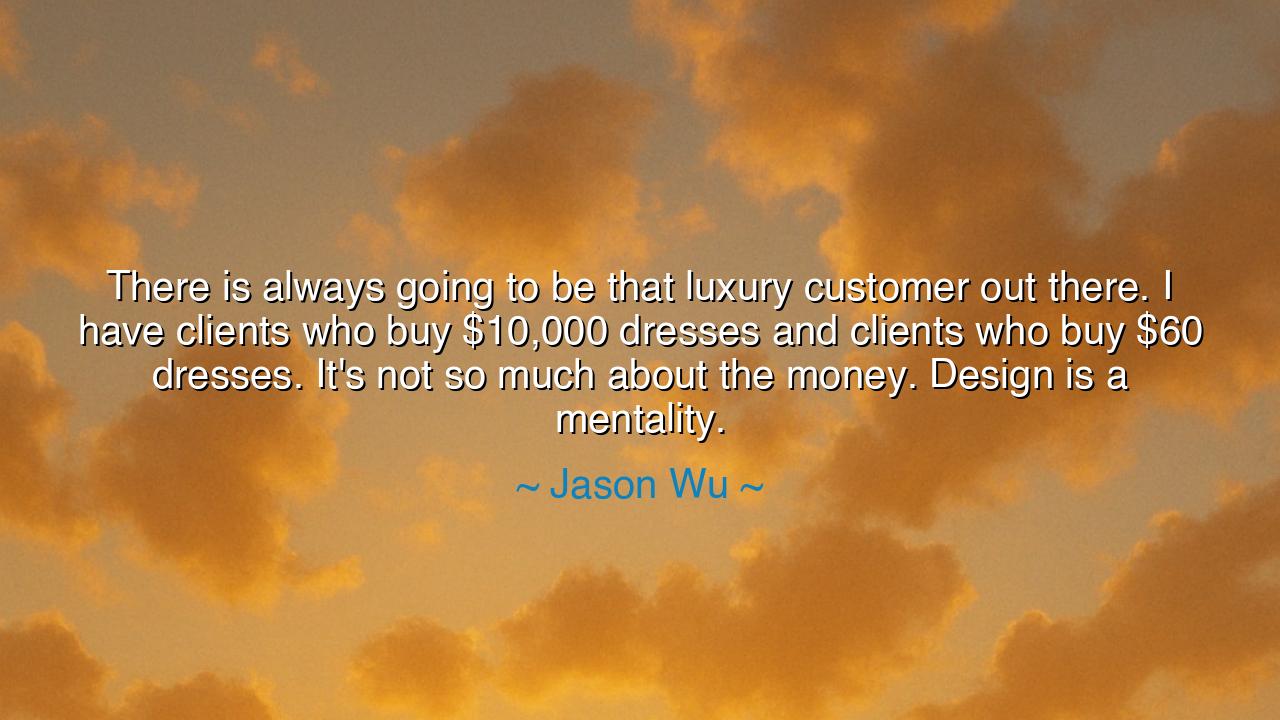
There is always going to be that luxury customer out there. I
There is always going to be that luxury customer out there. I have clients who buy $10,000 dresses and clients who buy $60 dresses. It's not so much about the money. Design is a mentality.






In the wise and grounded words of Jason Wu, the declaration — “There is always going to be that luxury customer out there. I have clients who buy $10,000 dresses and clients who buy $60 dresses. It’s not so much about the money. Design is a mentality.” — speaks not merely of fashion, but of philosophy and perception. Beneath the surface of commerce and craft lies a truth about the nature of creation itself: that true design transcends wealth, price, and possession. It is not about fabric or gold, but about vision — the ability to bring harmony, beauty, and meaning into the world. Wu’s words remind us that luxury is not found in opulence, but in the spirit with which something is conceived and made.
The meaning of this quote rests upon the distinction between value and cost. The world often confuses the two, believing that the worth of a thing is measured in currency. But Wu’s insight cuts through this illusion. A dress, whether costing ten thousand or sixty, can both carry grace — for what gives design its soul is not the thread, but the intention woven within it. “Design is a mentality,” he says — a way of seeing the world with sensitivity and purpose. It is the art of giving form to feeling, of shaping the material so that it mirrors the immaterial. In this sense, design is not something one buys; it is something one believes in.
The origin of these words lies in Wu’s own journey — one of perseverance, discipline, and reverence for craft. Born in Taiwan and raised in the United States, Jason Wu entered the world of fashion not through privilege, but through passion. Long before he dressed Michelle Obama for her historic inauguration, he was a young designer driven by a hunger to create beauty that transcended class or circumstance. Through experience, he learned that while some may wear couture gowns and others ready-to-wear dresses, what unites them is not wealth but aspiration — the shared desire to express selfhood through form. Thus, for Wu, design became not an indulgence, but a philosophy of life — a discipline of grace that honors both simplicity and grandeur.
In his wisdom, Wu echoes truths that reach far beyond the atelier. Consider the ancient story of Socrates, who once walked barefoot through the markets of Athens, gazing upon the goods and remarking, “How many things there are which I do not need.” Socrates understood that the beauty of life did not lie in possession but in perception — in the ability to discern what holds true worth. Similarly, Jason Wu’s statement reminds us that design, like wisdom, is not about accumulation but understanding. It is a mentality that sees form where others see emptiness, elegance where others see simplicity, and meaning where others see price.
Yet Wu’s words also carry an ethical dimension. In a world that often worships luxury as the ultimate sign of success, he reframes it as a state of mind rather than a symbol of status. A designer who serves both the woman in a $10,000 gown and the one in a $60 dress acts from a place of inclusivity, not elitism. This humility of vision honors the truth that beauty belongs to all. Wu teaches that a creator’s task is not to judge worth by wealth, but to elevate the human experience — to give everyone, regardless of means, a moment of dignity and self-expression. For the highest purpose of design is not vanity, but connection — the meeting of human hands and hearts through crafted form.
There is also a spiritual resonance in his words. To say that “design is a mentality” is to recognize that it begins within, long before it touches the material world. It is a way of perceiving balance, proportion, and essence — much like the Zen masters of old who saw art in the sweep of a brush, the stillness of a rock garden, or the curve of a single blossom. In this way, Wu’s philosophy extends beyond fashion into the realm of life itself: every person, no matter their station, is both designer and creation. The way one speaks, moves, or builds one’s days is also design — the shaping of existence through intention. Thus, to live beautifully is itself a form of artistry.
Let this, then, be the lesson: do not mistake wealth for refinement, or simplicity for lack. Whether you craft garments, words, relationships, or dreams, remember that true creation comes from within. Cultivate the mentality of design — a mind that seeks harmony, a heart that values purpose over price. Strive to make your life itself a work of design: balanced, meaningful, and generous in spirit. The one who designs with integrity will find that beauty flows not from the materials they possess, but from the soul they bring to their work.
And so, my listener, remember the wisdom of Jason Wu: “It’s not so much about the money. Design is a mentality.” Wealth fades, trends vanish, and luxury shifts like the tide — but mentality endures. Carry this truth with you in all you create. Approach your craft, your work, your life, with the designer’s eye and the artist’s heart. Then, whether you stand in silk or cotton, in success or simplicity, you will embody the highest form of luxury — the quiet elegance of a soul that creates with purpose.






AAdministratorAdministrator
Welcome, honored guests. Please leave a comment, we will respond soon